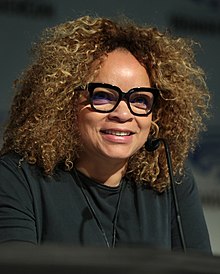Ruth E. Carter
Ruth E. Carter | |
|---|---|
 Carter in March 2018 | |
| Born | April 10, 1960 |
| Nationality | American |
| Occupation | Costume designer |
| Years active | 1982-present |
Ruth E. Carter (born April 10, 1960) is an American costume designer, for film and television, with over 40 films to her credit, who has mastered the look of multiple periods and genres in envisioning the clothing and overall appearance of a character or performer.[1] During her near 30 year film career, Carter has earned two nominations for an Academy Award for Best Costume Design for her work on the films Malcolm X (1992) directed by Spike Lee, and Amistad (1997) directed by Steven Spielberg.
Carter's most recent work was on the Afrofuturist superhero Marvel Cinematic Universe film Black Panther (2018), directed by Ryan Coogler.[2]
Early life
Carter graduated from Hampton University in Virginia, in 1982 with a Bachelor of Arts Degree.
Career
Carter began her career working as an intern in her hometown of Springfield, Massachusetts and at the Santa Fe Opera. She moved to Los Angeles in 1986.[3] While working at the Los Angeles Theater Center, Carter met director Spike Lee, who hired her for his second film, School Daze (1988), and with whom she worked on a number of films thereafter, including Do the Right Thing (1989), Mo' Better Blues (1990), Jungle Fever (1991), and Malcolm X (1992).[4][5] Carter has continued to work on films for Spike Lee, including Oldboy (2013), Da Sweet Blood of Jesus (2014), and Chi-Raq (2015).
In addition to designing costumes for the films of Spike Lee, Carter has worked with legendary directors such as Steven Spielberg and John Singleton, and has dressed actors from Denzel Washington to Josh Brolin, and actresses from Angela Bassett to Jane Fonda.
Carter is also known for her work on What's Love Got to Do with It (1993), Serenity (2005), Four Brothers (2005), Sparkle (2012), The Butler (2013) directed by Lee Daniels, and Selma (2014) directed by Ava DuVernay.[1]
Carter is currently designing costumes for the American television drama series Being Mary Jane on BET Networks, created by Mara Brock Akil and starring Gabrielle Union.[6]
Carter's most recent work was on the Afrofuturist superhero Marvel Cinematic Universe film Black Panther (2018), directed by Ryan Coogler. For the film, she traveled to southern Africa to draw aesthetic inspirations and to receive permission to incorporate traditional Lesotho designs into the film's costumes.[7]
Honors
- 2002: American Black Film Festival, Career Achievement Award[8]
- 2015: Essence, 2015 Black Women in Hollywood Award at the 8th Annual Black Women in Hollywood Luncheon[9][10]
Filmography
- School Daze (1988)
- I'm Gonna Git You Sucka (1988)
- Do the Right Thing (1989)
- Mo' Better Blues (1990)
- House Party 2 (1991)
- Jungle Fever (1991)
- The Five Heartbeats (1991)
- Malcolm X (1992)
- What's Love Got to Do with It (1993)
- Cobb (1994)
- Crooklyn (1994)
- Surviving the Game (1994)
- Money Train (1995)
- Clockers (1995)
- The Great White Hype (1996)
- B*A*P*S (1997)
- Rosewood (1997)
- Amistad (1997)
- Summer of Sam (1999)
- Price of Glory (2000)
- Love & Basketball (2000)
- Shaft (2000)
- Bamboozled (2000)
- Baby Boy (2001)
- Dr. Dolittle 2 (2001)
- I Spy (2002)
- Daddy Day Care (2003)
- Against the Ropes (2004)
- Serenity (2005)
- Four Brothers (2005)
- Spread (2009)
- Sparkle (2012)
- Teen Beach Movie (2013)
- Oldboy (2013)
- The Butler (2013)
- Selma (2014)
- Da Sweet Blood of Jesus (2014)
- Chi-Raq (2015)
- Kidnap (2016)
- Black Panther (2018)
Television
- Being Mary Jane (2013–Present)
- Roots (2016)
References
- ^ a b James, Kendra (23 November 2016). "Radical Fashion: An interview with the costume designer Ruth Carter". Lenny Letter.
- ^ https://www.vanityfair.com/hollywood/2018/02/black-panther-costumes-designer-ruth-carter-interview
- ^ Sarah Platanitis, "Hollywood costume designer Ruth Carter talks about her roots in Springfield and Oscar nods", The Republican, February 22, 2015.
- ^ Deborah Nadoolman Landis, "Ruth Carter" in Costume Design (Focal Press, 2003), ISBN 978-0-240-80590-0, pp. 37-45. Excerpt available at Google Books.
- ^ Pat Kirkham, Women Designers in the USA, 1900-2000: Diversity and Difference (Yale University Press, 2002), ISBN 978-0-300-09331-5, pp. 142-143. Excerpt available at Google Books.
- ^ "BET Networks Announces New Programming at Annual Upfront Presentation". The Futon Critic. April 2, 2013. Retrieved April 20, 2013.
- ^ Template:Cite Ùnews
- ^ "Actor Mekhi Pfifer and Costume Designer Ruth E. Carter Honored at American Black Film Festival", Jet, July 22, 2002.
- ^ http://www.essence.com/package/essence-black-women-hollywood
- ^ "Actor Mekhi Pfifer and Costume Designer Ruth E. Carter Honored at American Black Film Festival", Jet, July 22, 2002.
Further reading
- Kirkham, Pat; Stallworth, Shauna (2000). "Chapter 4: "Three Strikes Against Me": African American Women Designers". Women Designers in the USA, 1900-2000: Diversity and Difference. New York: Bard Graduate Center for Studies in the Decorative Arts. pp. 141–143, 258. ISBN 978-0-300-09331-5. OCLC 48628173.
- Landis, Deborah Nadoolman (2003). Screencraft. Costume Design. Burlington, MA: Focal Press. ISBN 978-0-240-80590-0. OCLC 718593913.
